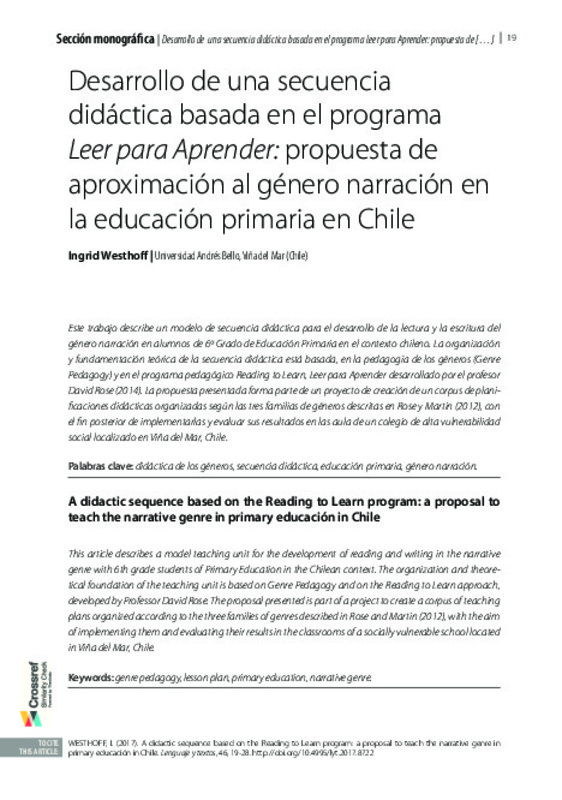ACEVEDO, C., COFFIN, C., GOUVEIA, C, LÖVSTEDT, A.C., y WHITTAKER, R. (2016). Teacher learning for European literacy education (TeL4ELE) 2011-2013 project. En: de SILVA, J.y FEEZ, S. (eds.). Exploring literacies. Theory, research and practice (pp. 327-333). Basingstoke, U.K.: Palgrave Macmillan.
GARCÍA PAREJO, I. (coord.) (2016). Géneros Discursivos y Sociedad. Planificación Didáctica Reading to Learn. Leer para aprender y aprender para escribir [en línea]. Madrid: UCM. http://eprints.sim.ucm.es/35748/
GARCÍA PAREJO, I. (coord.) (2017). Géneros Discursivos y Sociedad II. (en preparación).
[+]
ACEVEDO, C., COFFIN, C., GOUVEIA, C, LÖVSTEDT, A.C., y WHITTAKER, R. (2016). Teacher learning for European literacy education (TeL4ELE) 2011-2013 project. En: de SILVA, J.y FEEZ, S. (eds.). Exploring literacies. Theory, research and practice (pp. 327-333). Basingstoke, U.K.: Palgrave Macmillan.
GARCÍA PAREJO, I. (coord.) (2016). Géneros Discursivos y Sociedad. Planificación Didáctica Reading to Learn. Leer para aprender y aprender para escribir [en línea]. Madrid: UCM. http://eprints.sim.ucm.es/35748/
GARCÍA PAREJO, I. (coord.) (2017). Géneros Discursivos y Sociedad II. (en preparación).
HALLIDAY, M.A.K. (2004). An Introduction to Functional Grammar (2ª ed.). London: Arnold. (Primera edición publicada en 1994).
MARTIN, J.R. y ROSE, D. (2008). Genre Relations: Mapping Culture. London: Equinox.
MINISTERIO DE EDUCACIÓN (2008). Informe de Resultados de Escritura. SIMCE 2008 [en línea]. Santiago: Unidad de Curriculum y Evaluación. http://www.oei.es/historico/noticias/spip.php?article5958
MINISTERIO DE EDUCACIÓN (2014) Estándares Indicativos de Desempeño para los Establecimientos Educacionales y sus Sostenedores [en línea].Santiago: Unidad de Curriculum y Evaluación. http://archivos.agenciaeducacion.cl/documentos-web/Estandares_Indicativos_de_Desempeno.pdf
MOYANO, E.I. (2013). El lenguaje de las disciplinas y los géneros de su recontextualización escolar. Una aproximación desde la lingüística sistémico-funcional. En: MOYANO, Estela I., (coord.). Aprender Ciencias y Humanidades: una cuestión de lectura y escritura. Aportes para la construcción de un programa de inclusión social a través de la educación lingüística (pp.31-78). Buenos Aires: Universidad Nacional de General Sarmiento.
PARODI, G. (2004). Textos de especialidad y comunidades discursivas técnico-profesionales: una aproximación basada en corpus computarizado. Estudios Filológicos, 39, 7-36. https://doi.org/10.4067/S0071-17132004003900001
PAINTER, C. (1996). The development of language as a resource for thinking: a linguistic view of learning. En: HASAN, R. y WILLIAMS, G. (eds.). Literacy in Society (pp. 50-85). London: Longman.
ROJAS GARCÍA, I. OLAVE ARIAS, G. y CISNEROS ESTUPIÑÁN, M. (2016). Alfabetización académica y pedagogía de género discursivo en la Lingüística Sistémico Funcional. Una experiencia de trabajo. Signos. Estudios de Lingüística, 49(S1), 224-246. https://doi.org/10.4067/S0718-09342016000400011
ROSE, D. (2011). Beating educational inequality with an integrated reading pedagogy. En: CHRISTIE F. y SIMPSON, A. (eds.). Literacy and Social Responsibility: Multiple Perspectives. London: Equinox.
ROSE, D. (2014). Reading to learn: Accelerating learning and closing the gap [en línea]. Sydney: Reading to Learn. http://www.readingtolearn.com.au
ROSE, D. y MARTIN, J.R. (2012). Learning to Write, Reading to Learn: Genre, Knowledge and Pedagogy in the Sydney School. London: Equinox
[-]








